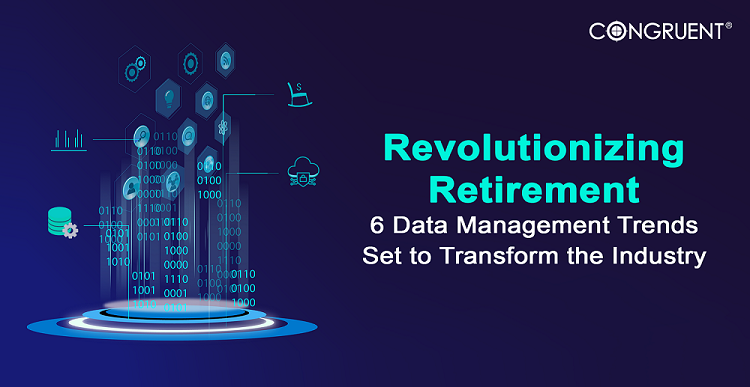
Retirement planning has been a critical aspect of any individual’s financial roadmap. Managing and analyzing retirement data can be complex due to the information involved. But there are exciting possibilities for transforming the retirement industry. New tools and technologies paved the way for efficient data analysis, which helps with everything from predictive analytics to machine learning algorithms. This could help individuals enjoy their golden years more comfortably than ever before. In this blog post, we will explore some of these cutting-edge developments shaping the future of retirement planning and their impact on individuals and organizations.
Overview of Data Management in the Retirement Industry
The retirement industry is one of the most data-intensive industries in the world. It covers a wide range of processes and activities, from the capture and storage of data to its analysis and interpretation. The industry relies heavily on data for managing portfolios, administering benefits, and communicating with clients. While effective use of data can increase operational efficiency and reduce costs, several challenges are associated with data management in the retirement industry. This includes the need to maintain confidentiality and security of data, as well as its correct interpretation. So, here are some of the top 5 trends in retirement data management.
Emerging Trends in Data Management That Can Transform the Retirement Industry
The Growing Role of Automation and Digitalization
Digitization and Cloud-based solutions offer several advantages over traditional on-premises solutions, including lower costs, scalability, and flexibility. Robo-advisors are automated investment advice platforms that use algorithms to provide recommendations based on a user’s goals and risk tolerance. Robo-advisors can reduce costs and increase transparency in the investment process. Retirement Industry companies must adapt their products and services to meet this.
The Growing Role of Automation and Digitalization
Digitization and Cloud-based solutions offer several advantages over traditional on-premises solutions, including lower costs, scalability, and flexibility. Robo-advisors are automated investment advice platforms that use algorithms to provide recommendations based on a user’s goals and risk tolerance. Robo-advisors can reduce costs and increase transparency in the investment process. Retirement Industry companies must adapt their products and services to meet this.
Leveraging Big Data Analytics
As the saying goes, data is the new oil. This is especially true in the retirement industry, where big data analytics is starting to take off. Several emerging trends in data management can help transform the retirement industry, including:
1. Data discovery and visualization tools help users explore and visualize data. This makes it easy to find patterns and insights that might be overlooked.
2. Predictive analytics: This technology uses historical data to identify patterns and predict future outcomes. It is increasingly used in the retirement industry to forecast investment returns, longevity risk, and healthcare costs.
3. Machine learning: It has numerous applications in the retirement industry, including identifying fraud or waste, optimizing investment portfolios, and recommending products or services to customers.
4. Blockchain: This distributed ledger technology promises to revolutionize many industries, including retirement planning. Its tamper-proof nature makes it ideal for tracking individual contributions and benefits payments while providing a secure platform for smart contracts or other automation processes.
Real-Time Monitoring and Risk Mitigation
Real-time monitoring and risk mitigation are critical for retirement plan administrators to ensure compliance and accuracy of retirement data. Administrators can prevent costly errors and legal liabilities by identifying and addressing potential risks early. The use of technology, data analytics, and internal controls can help achieve effective real-time monitoring and risk mitigation in retirement data management.
Artificial Intelligence
AI can help businesses automate repetitive tasks, such as data entry, and make better decisions by analyzing large data sets. AI is also used to develop new products and services, such as robo-advisors. AI-based solutions also make it possible to offer personalized services to customers. Providing personalized investment strategies and optimizing financial portfolios, are few areas where the industry stakeholders can take advantage.
Cloud-Based Storage Solutions
As the volume of data generated by the retirement industry continues to grow, so does the need for efficient and effective storage solutions. With several opportunities to improve efficiency and lower costs, cloud-based storage solutions in the retirement industry enable secure, centralized data management, streamlined processes, and real-time access to vital information, enhancing efficiency and collaboration.
Conclusion
The modern retirement industry is under pressure like never before. With an aging population and increased life expectancies, the demand for retirement services is higher than ever. At the same time, retirees are more likely to live on a fixed income, making it difficult to keep up with retirement costs.
Efficient solutions for data management, embracing artificial intelligence, and making data-driven decisions enable retirement plan administrators to help improve retiree quality of life with the right investment solutions. Adapting emerging technology will change data management in the retirement plan industry in many ways, including improvements to efficiency, security, transparency, automation, and costs. Need help getting started with seamless data management that can cut through the noise? Congruent is just a click away.
